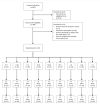Promoting Hand Hygiene During the COVID-19 Pandemic: Parallel Randomized Trial for the Optimization of the Soapp App
- PMID: 36599056
- PMCID: PMC9938438
- DOI: 10.2196/43241
Promoting Hand Hygiene During the COVID-19 Pandemic: Parallel Randomized Trial for the Optimization of the Soapp App
Abstract
Background: Hand hygiene is an effective behavior for preventing the spread of the respiratory disease COVID-19 and was included in public health guidelines worldwide. Behavior change interventions addressing hand hygiene have the potential to support the adherence to public health recommendations and, thereby, prevent the spread of COVID-19. However, randomized trials are largely absent during a pandemic; therefore, there is little knowledge about the most effective strategies to promote hand hygiene during an ongoing pandemic. This study addresses this gap by presenting the results of the optimization phase of a Multiphase Optimization Strategy of Soapp, a smartphone app for promoting hand hygiene in the context of the COVID-19 pandemic.
Objective: This study aimed to identify the most effective combination and sequence of 3 theory- and evidence-based intervention modules (habit, motivation, and social norms) for promoting hand hygiene. To this end, 9 versions of Soapp were developed (conditions), and 2 optimization criteria were defined: the condition with the largest increase in hand hygiene at follow-up and condition with the highest engagement, usability, and satisfaction based on quantitative and qualitative analyses.
Methods: This study was a parallel randomized trial with 9 intervention conditions defined by the combination of 2 intervention modules and their sequence. The trial was conducted from March to August 2021 with interested participants from the Swiss general population (N=232; randomized). Randomization was performed using Qualtrics (Qualtrics International Inc), and blinding was ensured. The duration of the intervention was 34 days. The primary outcome was self-reported hand hygiene at follow-up, which was assessed using an electronic diary. The secondary outcomes were user engagement, usability, and satisfaction assessed at follow-up. Nine participants were further invited to participate in semistructured exit interviews. A set of ANOVAs was performed to test the main hypotheses, whereas a thematic analysis was performed to analyze the qualitative data.
Results: The results showed a significant increase in hand hygiene over time across all conditions. There was no interaction effect between time and intervention condition. Similarly, no between-group differences in engagement, usability, and satisfaction emerged. Seven themes (eg, "variety and timeliness of the task load" and "social interaction") were found in the thematic analysis.
Conclusions: The effectiveness of Soapp in promoting hand hygiene laid the foundation for the next evaluation phase of the app. More generally, the study supported the value of digital interventions in pandemic contexts. The findings showed no differential effect of intervention conditions involving different combinations and sequences of the habit, motivation, and social norms modules on hand hygiene, engagement, usability, and satisfaction. In the absence of quantitative differences, we relied on the results from the thematic analysis to select the best version of Soapp for the evaluation phase.
Trial registration: ClinicalTrials.gov NCT04830761; https://clinicaltrials.gov/ct2/show/NCT04830761.
International registered report identifier (irrid): RR2-10.1136/bmjopen-2021-055971.
Keywords: COVID-19; MOST; Multiphase Optimization Strategy; behavior change intervention; habit; hand hygiene; mobile phone; motivation; smartphone apps; social norm.
©Dario Baretta, Melanie Alexandra Amrein, Carole Bäder, Gian Giacomo Ruschetti, Carole Rüttimann, Maria Del Rio Carral, Carlo Fabian, Jennifer Inauen. Originally published in JMIR mHealth and uHealth (https://mhealth.jmir.org), 03.02.2023.
Conflict of interest statement
Conflicts of Interest: None declared.
Figures


References
-
- Rabie T, Curtis V. Handwashing and risk of respiratory infections: a quantitative systematic review. Trop Med Int Health. 2006 Mar;11(3):258–67. doi: 10.1111/j.1365-3156.2006.01568.x. https://onlinelibrary.wiley.com/doi/10.1111/j.1365-3156.2006.01568.x TMI1568 - DOI - DOI - PMC - PubMed
-
- Beale S, Johnson AM, Zambon M, Flu Watch Group. Hayward AC, Fragaszy EB. Hand hygiene practices and the risk of human coronavirus infections in a UK community cohort. Wellcome Open Res. 2021 Jun 22;5:98. doi: 10.12688/wellcomeopenres.15796.2. https://europepmc.org/abstract/MED/34250260 - DOI - PMC - PubMed
-
- Lee JK, Bullen C, Ben Amor Y, Bush SR, Colombo F, Gaviria A, Karim SS, Kim B, Lavis JN, Lazarus JV, Lo YC, Michie SF, Norheim OF, Oh J, Reddy KS, Rostila M, Sáenz R, Smith LD, Thwaites JW, Were MK, Xue L, (The Lancet COVID-19 Commission Task Force for Public Health Measures to Suppress the Pandemic) Institutional and behaviour-change interventions to support COVID-19 public health measures: a review by the Lancet Commission Task Force on public health measures to suppress the pandemic. Int Health. 2021 Sep 03;13(5):399–409. doi: 10.1093/inthealth/ihab022.6273788 - DOI - PMC - PubMed
Publication types
MeSH terms
Associated data
LinkOut - more resources
Full Text Sources
Medical
Miscellaneous

